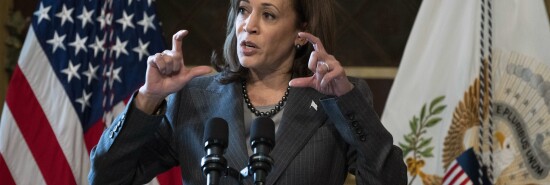
Kamala Harris doesn’t even understand why she is unpopular
Quin Hillyer
Video Embed
To read Monday’s New York Times story on the political struggles of Vice President Kamala Harris is to see that neither Harris nor the establishment media have a clue about why she is unpopular.
The article defines the problem this way: “The painful reality for Ms. Harris is that in private conversations over the last few months, dozens of Democrats in the White House, on Capitol Hill and around the nation … said she had not risen to the challenge of proving herself as a future leader of the party, much less the country.”
HARRIS, ‘WHAT’S SHE DOING? WHERE IS SHE?’
With President Joe Biden being so old, the article explained, the public wants reassurance that the vice president can handle the top job if something happens to Biden. Yet her approval rating of just 39% trails even Biden’s anemic 42% approval rate. In sum, she further drags down an already weak ticket.
As the article continues, though, it becomes evident that neither Democratic insiders nor the journalists who cover them understand the nature of her problem. Numerous paragraphs lament “the unique dynamics of being a woman of color in a job previously filled only by men,” as if that is a major source of her difficulties. Oh, and the poor thing is also only 5 feet, 2 inches tall, which makes it hard to project leadership and means that office chairs need to be adjusted downward. (The horror!)
Even more preposterously, the whole Harris orbit seems to think her biggest challenge is that she is too substantive to be comfortable in “a job where symbolism and politics are prioritized.”
“My bias has always been to speak factually, to speak accurately, to speak precisely about issues and matters that have potentially great consequence,” she said recently. “I find it off-putting to just engage in platitudes.” She’s just more comfortable, according to the article, as the brilliant, detail-oriented prosecutor “who can cross-examine policymakers on the intricacies of legislative proposals.”
This is risible, coming from someone about whom social media frequently erupts to mock her vacuous, weirdly repetitive, substance-free public statements. Examples are legion, perhaps most infamously highlighted by her discussion of high-speed internet at a community center: “We were all doing a tour of the library here and talking about the significance of the passage of time,” she told the crowd. “Right? The significance of the passage of time. … So, when you think about it, there is great significance to the passage of time in terms of what we need to do to lay these wires, what we need to do to create these jobs. And there is such great significance to the passage of time when we think about a day in the life of our children.”
Huh?
Yet even taking into account her inscrutable inanities and her off-putting habit of emitting a screechy cackle at bizarre times, her biggest problem is one that neither she nor the New York Times reporters identify at all. Her biggest problem is that an unpleasantly cackling and platitudinous politician is even more objectionable when she pushes radical positions unpopular with clear majorities of people.
When the administration’s point person on illegal immigration is for radically open borders and free healthcare for the illicit immigrants, and a humanitarian crisis ensues, that’s not popular. When the administration’s lead person reacting to policing problems is radically against tough policing and has promoted groups bailing murderers out of prison, especially when she says her anti-officer preferences are “nonnegotiable,” that’s unpopular.
And so on.
Harris’s problem isn’t that she’s too substantive. Her problems are that she’s usually not substantive at all, but when she is, her substance is god-awful.
CLICK HERE TO READ MORE FROM THE WASHINGTON EXAMINER
